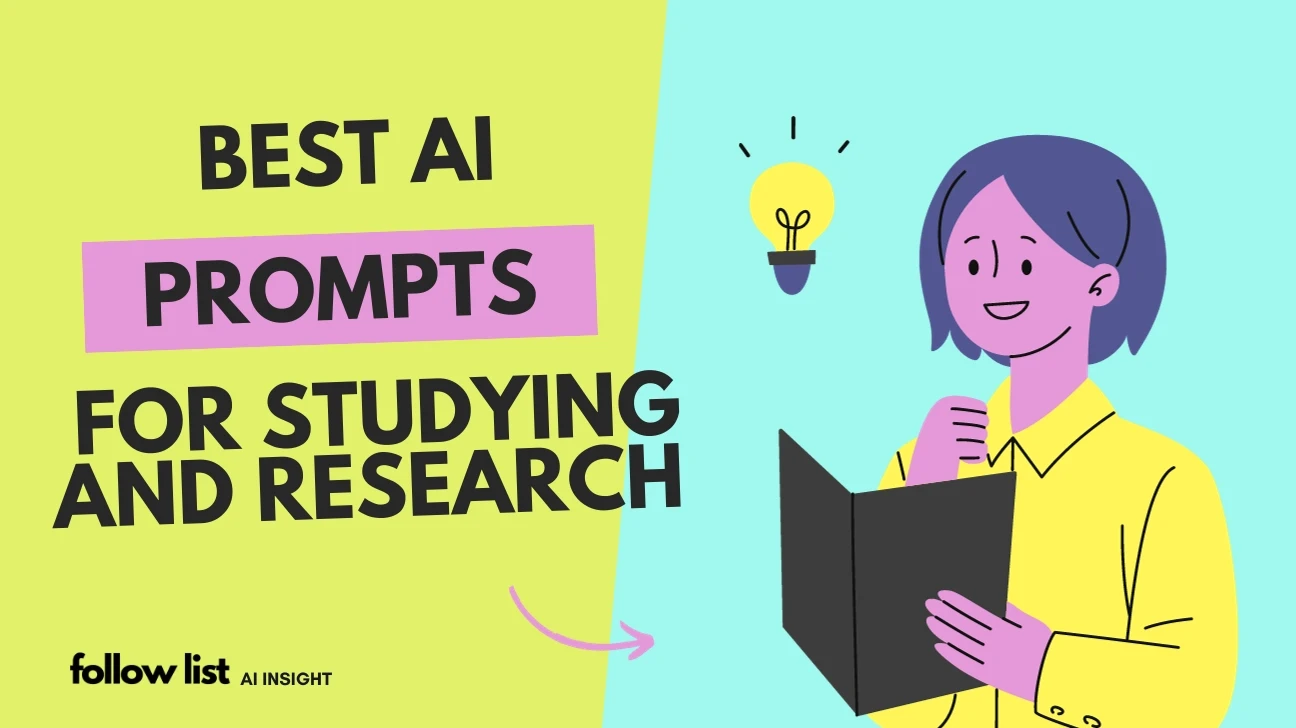
Table of Contents
Listen to this article
Best AI Prompts for Studying and Research - Introduction:
AI prompts are a powerful tool that can be used to improve studying and research. AI prompts can be used to support students and researchers at all levels, from expanding notes and explaining concepts to finding research topics and generating creative ideas.
For example, a student could use an AI prompt to generate a summary of their lecture notes, or a researcher could use an AI prompt to identify gaps in the literature on a particular topic.
AI prompts offer a number of benefits for studying and research. They can help students to learn more effectively and efficiently, and they can enable researchers to make new discoveries and explore new ideas.
By providing clear and concise instructions, AI prompts can help students and researchers to:
Expand their knowledge: AI prompts can be used to generate summaries of complex topics, identify key concepts, and provide insights into different perspectives.
Deepen their understanding: AI prompts can be used to generate explanations of complex concepts at different levels of detail, and to provide examples and case studies.
Develop their critical thinking skills: AI prompts can be used to generate challenges and counterarguments, and to help students and researchers to develop their own arguments.
Save time and effort: AI prompts can be used to automate tasks such as literature review, data analysis, and writing.
Examples -
Generating Study Questions: AI prompts can assist students in generating study questions tailored to their learning materials. For instance, if a student is studying biology, they can input their textbook or lecture notes into an AI-powered tool, which will then generate a set of questions to help reinforce their understanding.
Research Idea Generation: Researchers can use AI prompts to spark new research ideas. By inputting keywords or research areas into AI-powered tools, researchers can receive suggestions for novel research topics and angles, helping them stay at the forefront of their field.
Automated Literature Review: Conducting a comprehensive literature review can be time-consuming. AI prompts can streamline this process by summarizing and categorizing existing research papers, making it easier for researchers to identify gaps in the literature.
Writing Assistance: Whether it's writing research papers, essays, or reports, AI prompts can provide suggestions and even generate content. They can help writers with sentence structure, grammar, and even offer ideas for expanding on a topic.
Ideas for using AI prompts in studying and research:
- Use AI prompts to generate study guides and practice questions.
- Use AI prompts to identify gaps in your knowledge and develop a learning plan.
- Use AI prompts to generate research ideas and hypotheses.
- Use AI prompts to conduct literature reviews and synthesize research findings.
- Use AI prompts to develop research proposals and presentations.
Ai Prompts that will help in Note Taking:
- Compare and contrast different note-taking methods, such as Cornell notes, mind maps, and the outlining technique.
- How can you develop an efficient shorthand system to capture key information during lectures or readings?
- Explore the use of technology in note-taking, including digital note-taking apps and voice recording tools.
- Discuss the importance of active listening and engagement while taking notes to enhance comprehension and retention.
- How can you organize and categorize your notes effectively for easy retrieval and review?
- Explore the benefits of visual aids, such as diagrams and charts, in enhancing note-taking and understanding complex concepts.
- How can you incorporate personal reflections and connections into your notes to deepen your understanding of the material?
- Discuss the potential drawbacks of over-relying on verbatim note-taking and ways to promote paraphrasing and summarizing.
- How can you collaborate with peers to improve and supplement your notes through group discussions and shared resources?
- Explore the role of note-taking in long-term learning and how to review and revise your notes for better retention.
Ai Prompts for Test Taking Techniques:
- Discuss the importance of effective test preparation, including creating a study schedule and setting specific goals.
- Explore different strategies for managing test anxiety and stress to perform at your best during exams.
- How can you analyze past tests and practice exams to identify patterns and areas for improvement?
- Discuss the benefits of using mnemonic devices and memory aids to recall information during exams.
- Explore the concept of "testwiseness" and how to approach different types of test questions (e.g., multiple-choice, essay) effectively.
- How can you practice time management during exams to ensure you have enough time to answer all questions?
- Discuss the importance of reading instructions carefully and how to avoid common mistakes caused by misinterpretation.
- Explore the benefits of self-assessment and self-scoring after exams to learn from mistakes and identify learning gaps.
- How can you develop a strategy for tackling challenging questions and avoiding "guessing" pitfalls?
- Discuss the role of physical and mental well-being in test performance and ways to maintain focus and alertness during exams.
Ai Prompts for Study Techniques:
- Compare and contrast active studying versus passive studying approaches, and their impact on learning outcomes.
- Explore the benefits of spaced repetition and the use of flashcards in long-term retention of information.
- How can you create a productive study environment that minimizes distractions and promotes focus?
- Discuss the concept of "interleaving" and how to incorporate it into your study routine for more effective learning.
- Explore the impact of teaching or explaining concepts to others as a study technique to reinforce your understanding.
- How can you leverage the Pomodoro Technique or other time management methods to maintain focus and prevent burnout?
- Discuss the benefits of teaching and studying in different locations to enhance memory recall and generalization of knowledge.
- How can you use "self-testing" and practice quizzes to assess your learning progress and identify areas for improvement?
- Explore the role of metacognition in effective studying and how to develop self-awareness of your learning strategies.
- Discuss the potential benefits of group study sessions and peer teaching in deepening your understanding of the material.
Ai Prompts for Research Methods:
- Compare and contrast qualitative and quantitative research methods, and their suitability for different research questions.
- Explore the steps involved in conducting a literature review and its importance in the research process.
- Discuss the role of ethical considerations in research, including informed consent and protecting participants' privacy.
- How can you formulate a clear research question or hypothesis to guide your study?
- Explore the process of data collection, including surveys, interviews, experiments, and observational studies.
- Discuss the importance of sample size and representative sampling in ensuring the reliability and validity of research findings.
- How can you analyze and interpret research data using statistical tools and software?
- Explore the process of peer review and its significance in validating research findings and ensuring academic rigor.
- Discuss the potential biases and limitations that researchers may encounter during their studies and how to address them.
- How can you effectively present research findings in a structured and compelling manner through academic writing or presentations?
Ai Prompts for Memory Techniques:
- Discuss the concept of "chunking" and how it can enhance memory by grouping information into meaningful units.
- Explore the method of loci (memory palace) technique and how it can be used to memorize lists or sequences.
- How can you use the "linking" or "storytelling" method to create vivid associations and aid in memory recall?
- Discuss the benefits of creating concept maps or mind maps to visualize relationships between ideas and improve retention.
- Explore the role of the "testing effect" and how practicing retrieval through quizzes can strengthen memory retention.
- How can you leverage the "spaced repetition" technique to review and reinforce information over time?
- Discuss the impact of sleep on memory consolidation and the benefits of getting adequate rest for learning.
- How can you use acronyms and mnemonic devices to remember complex information and sequences?
- Explore the potential benefits of multisensory learning and how incorporating different senses can improve memory.
- Discuss the role of mindfulness and focused attention in memory formation and retrieval.
Conclusion:
AI prompts are a powerful tool that can be used to improve studying and research in many different ways. By providing clear and concise instructions, AI prompts can help students and researchers to expand their knowledge, deepen their understanding, develop their critical thinking skills, and save time and effort.
AI prompts are a valuable tool that can be used to enhance your learning and research experience. By taking advantage of this technology, you can save time and effort, deepen your understanding, and achieve your academic and professional goals.





